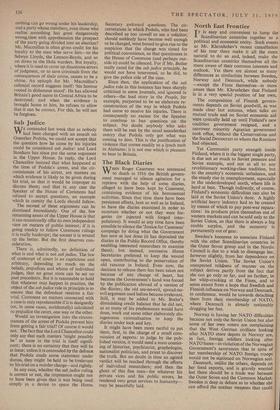The Black Diaries
WHEN Roger Casement was sentenced to death in 1916 the British govern- ment managed to silence agitation for a reprieve with the help of some diaries, alleged to have been kept by Casement, containing evidence of his homosexual activities. Since that time there have been persistent efforts, here as well as in Ireland, to have the diaries examined in order to ascertain whether or not they were for- geries (or injected with forged inter- polations). It would at any time have been possible to silence the 'Justice for Casement' campaign by doing what the Government has now at last done (it has deposited the diaries in the Public Record Office, thereby enabling interested researchers to examine them); but instead, successive Home Secretaries preferred to keep the wound open, contributing to the preservation of old rancour in Ireland. Even now, the decision to release them has been taken not because of any change of heart, but because the Government's hand was forced by the publication abroad of a version of the diaries; the old see-no-evil, spread-no- evil argument used before became irrelevant. Still, it may be added to Mr. Butler's diminishing credit balance that he did not, as so many of his predecessors would have done, work out some other elaborately dis- ingenuous rationalisation to keep the diaries under lock and key.
It might have been more tactful to put them, first, in the charge of a small com- mission of experts: to judge by the pub- lished version, it would need a team consist- ing of historian, psychiatrist, graphologist, nationalist politician, and priest to discover the truth. But no doubt in time an agreed verdict will be reached through the efforts of individual researchers; and then the ghost of this fine man—for whatever his private vices and his public errors, he rendered very great services to humanity— may be peacefully laid.






























 Previous page
Previous page